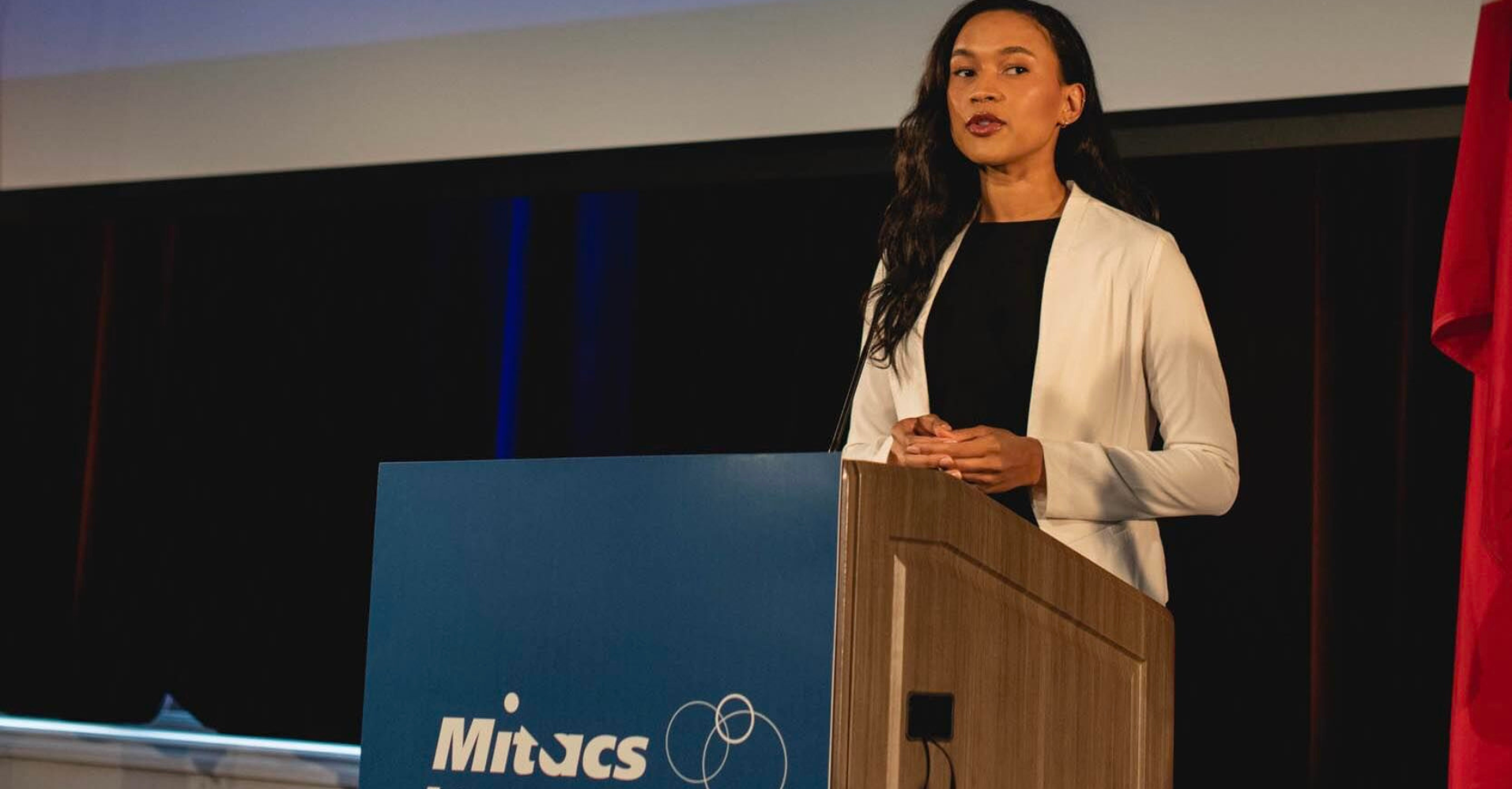Waterloo, ON – The 8th annual Mitacs Entrepreneur Awards took place in Waterloo, Ontario on May 18, 2023. The festivities celebrated the efforts of five up-and-coming researchers who have plunged into entrepreneurship to transform their groundbreaking discoveries into innovative companies that are changing the lives of Canadians.
These awards are an important opportunity to showcase Mitacs’ talent and honour some of Canada’s most innovative start-ups, all founded by exceptional individuals who have participated in Mitacs programs and gone on to become entrepreneurs and business owners in their respective fields. The Mitacs Entrepreneurship Awards are also an opportunity for researchers, faculty and the private sector to come together, in person and online, to exchange ideas and forge new partnerships in the innovation ecosystem.
The winners of the Mitacs 2023 Entrepreneurship Awards are :
- Remarkable entrepreneurship: Rafaela Andrade, Ph. D., postdoctoral researcher at Dalhousie University’s School of Biomedical Engineering, and co-founder and CEO of Myomar Molecular. Rafaela Andrade’s company has developed the world’s first urine test to measure muscle loss. The aim is to monitor indicators of muscle loss at an early stage, so that precautions can be taken. Normally, muscle loss is only monitored after the diagnosis of neuromuscular diseases such as ALS or muscular dystrophy, or after the appearance of signs of muscle loss, using expensive medical imaging systems such as MRI or CT scans. Myomar Molecular’s test is designed for the general population and works like a simple home pregnancy test, allowing users to obtain their results by taking a photo with their phone of the strip used for the test.
- Entrepreneurship as a catalyst for change : Jeremy Wang, Ph. D., Mechanical Engineering at the University of Waterloo, Co-Founder and Chief Operating Officer, Ribbit. Jeremy Wang is being recognized for his pioneering work in developing Canada’s first autonomous cargo airline, which is on track to launch a commercial pilot project by the middle of next year. The company’s aim is to reorganize the transport network to make it faster, more efficient and more accessible to remote communities lacking reliable air transport for essential goods such as food and medicine. Ribbit has been working in collaboration with Transport Canada since its inception in 2020, and completed its first door-to-door hands-free flight in 2021 – a first in Canada.
- Social entrepreneurship: Nanette Sene , master’s degree in industrial engineering from Polytechnique Montréal, CEO and co-founder of Juno Technologies. Nanette Sene is rewarded for the innovative work of her company, which has developed a cutting-edge wearable device combining heat and microelectronics to quickly relieve muscle cramps and menstrual pain. This first-of-its-kind rechargeable device, worn comfortably under clothing, offers long-lasting relief from menstrual pain (or dysmenorrhea), a widespread problem affecting 80% of women worldwide and leading to lost productivity and absenteeism. It discreetly adheres to the pelvic area of the abdomen and uses microelectronics to relax muscles and block pain signals sent to the brain.
- Entrepreneurship with global impact: Irsa Winington, postdoctoral researcher at Queen’s University Cancer Research Institute and business development manager at mDETECT inc. Irsa Wiginton eases the burden on breast cancer patients by giving oncologists an effective way of monitoring tumors to determine the best personalized treatment using a simple routine blood test. The blood test monitors specific epigenetic markers of tumor DNA that pass into the patient’s bloodstream, and uses next-generation sequencing to quantify changes in tumor volume. A tube of blood, taken every week or two, provides a precise measure of whether a tumour is shrinking or continuing to grow, indicating whether current treatment is effective or not. A clinical study was launched by the Kingston General Hospital and the Ottawa Hospital.
- Ecological entrepreneurship: Kevin Kung, postdoctoral researcher in the Biomass and Bioenergy Research Group at the University of British Columbia (UBC), technical director of Takachar. Kevin Kung is helping to improve air quality worldwide by offering farmers an environmentally friendly alternative to open burning, and foresters a better way to manage flammable forest residues. Its revolutionary innovation, a small-scale, portable system, converts expensive crop and forest residues (biomass) into higher-value bioproducts, such as fertilizer blends, chemicals and biofuels. The company is currently working with several First Nations communities in British Columbia and other partners to test several prototypes of the technology in collaboration with UBC.


